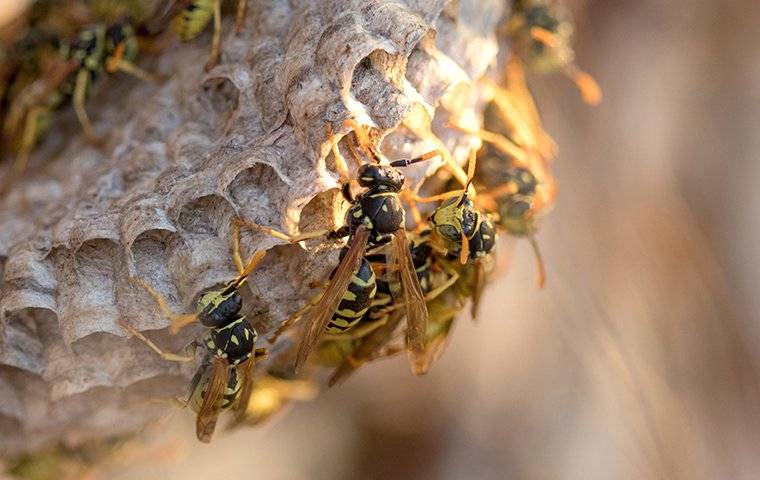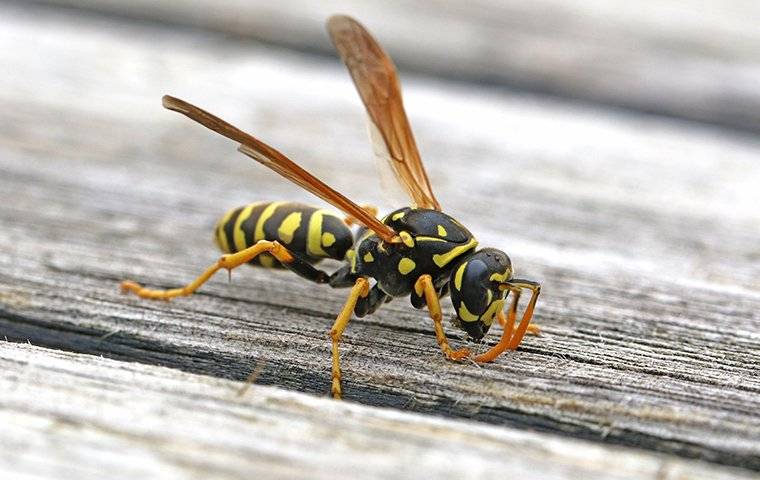Usually, around the summer months, Monmouth County homeowners may hear an increase of buzzing and spot more insects with wings. Some of these Monmouth County pests are just a simple part of nature, but others are far more dangerous to both health and property. The paper wasp, for example, is highly lauded for its environmental contributions; however, they are also a very territorial and aggressive pest that will sting anyone who threatens them. The result of their stings can vary based on the individual but tend to be very serious nonetheless. Luckily, there’s help.
The team of pest experts at Alliance Pest Services has been providing pest control in Monmouth County since 1983, so we know a thing or two about paper wasps. We combine Integrated Pest Management methods along with an intimate knowledge of local pest behavior in order to completely eliminate and prevent wasp problems for our community. We hope that you find the following guide to paper wasps helpful and if we can provide you with Monmouth County pest control to assuage your concerns about wasps, please contact us today.


What Paper Wasps Look Like
Paper wasps are a very common pest problem for Monmouth County homeowners but they’re actually not one pest exclusively, but rather 22 different types of exact species that get their name from the materials that they use to build their nests. Nonetheless, paper wasps are a big issue because of their aggressive and destructive behavior. At a distance, it can be difficult to distinguish paper wasps from their stinging insect counterparts like bees and other winged pests. That said, being able to determine what a paper wasp looks like is very important because the behavior that people exhibit around them should differ, as will the methods of removal and prevention.
To start, paper wasps include insects like hornets and yellow jackets, which differ in their characteristics as well. The yellow jacket possesses a shocking combination of yellow and black coloring that is almost mesmerizing. It has large, downturned black antennae and its body is covered with fuzz. The yellow jacket has a very narrow waist, while the hornet tends to be a bit more tubular and stocky in shape. The hornet, on the other hand, is usually a striking combination of black, brown, red, and yellow. Hornets also have shorter, less pronounced antennae but are significantly larger in size than yellow jackets.
With regard to the type of nests that these two prominent species of paper wasp build, one of the biggest differences is that hornets build their nests above ground while yellow jackets prefer to create their nests below ground. Each will construct its nests in seemingly sneaky places, so homeowners should try to identify these nests as quickly as possible. For hornets, they may opt for tall trees or shrubs; however, they may also use the eaves of a home or inside of drywall. For yellow jackets, they dig holes in the ground, so unpatched lawns are primed and ready for them. These paper wasps will also take advantage of burrows that have been left behind by rodents and smaller pests.
For more information on paper wasp prevention, please contact Alliance Pest Services today.
Why Paper Wasps Are Attracted To Your Home
Paper wasps are one of those pests that you hope to never see around your Monmouth County home because you know they bring painful stings with them. But what attracted them in the first place? To start, their diet consists mostly of nectar and other insects. For wasps, the concept of nectar is very broad. Of course paper wasps are enticed by fruit trees, gardens, and blossoming flowers, but things like fallen and rotten fruits can also attract them.
Paper wasps also become a big issue during barbeque season, when it’s likely that you have food outside that isn’t properly covered or when the garbage begins to pile up. Paper wasps will eat anything they can find, from juicy watermelon to paper plates that are covered with meat fats and oils. Additionally, because paper wasps like floral scents that remind them of nectar, they may be attracted to people who wear perfume or use scented hygiene products.
The types of insects that they eat can also determine the presence of paper wasps. These pests include caterpillars, spiders, crickets, and beetles. Many of these pests are attracted to the presence of other pests, so the attraction of paper wasps can sometimes be traced to the state of cleanliness in your home, whether or not you’re dealing with moisture issues, and how you maintain your yard.
At Alliance Pest Services, we understand the variability that exists in whether or not paper wasps will be attracted to your property, which is why we offer year-round services to address these pests. Our pest specialists receive ongoing training so that we are always providing you with the very best service and following the latest best practices. We include paper wasp control as part of our residential programs, which include six inspections throughout the year on a bi-monthly basis, nest removal, habitat modification, safe product application, and regular monitoring. In order to beat the odds against paper wasps, contact us today.
Why Are Paper Wasps Aggressive?
One of the most common reasons why people fear paper wasps is because of their signature aggression. For example, a hornet has the ability to fly at speeds upwards of 10 miles per hour and sting a person repeatedly, while a yellow jacket will sting and bite multiple times. Their stings and bites are venomous, which can produce a series of allergic reactions that vary from person to person. But why are they so aggressive in the first place?
A basic understanding implies that paper wasps are very social insects and will do anything to protect their queen. So if anything were to threaten their nest, then they would have to defend it intensely. If a homeowner harmlessly stumbles across an underground nest or tries to remove an active above-ground nest, paper wasps will likely perceive these actions as a direct threat to their livelihood and will sting to defend it. Another reason that explains the paper wasps’ aggressive behavior is the general lack of food that they come across. While it might seem that food sources are bountiful, once the queen stops producing eggs and plant material dies off, both in the fall, many adult paper wasps lose their main food sources, which drives them to go elsewhere. They then start turning to sugars like juices and packaged bakery items as a substitute.
Because paper wasps are so unpredictable while still being a very serious threat, Alliance Pest Services follows Integrated Pest Management methods to address them. This comprehensive approach strives for long-lasting pest-free results that also allow us to match and get ahead of paper wasp activity. This method is the safest, most reliable way of dealing with these wily pests. For more information on paper wasp control, please contact us today.
How To Properly Deal With Paper Wasps
Each year, paper wasps have the ability to become an issue for Monmouth County property owners. They come in search of sweet, meaty, or oily foods as well as any favorable conditions that your yard might possess. This may include the presence of sweet, blossoming flowers but it may also be as simple as having an old nest present somewhere around your home. Because paper wasps are so determined and the result of their stings can be very harmful to your health, the best way to properly deal with them is through professional pest control.
At Alliance Pest Services, we have been working with homeowners on issues like these since our inception in 1983. We are a QualityPro certified company and have countless other affiliations and memberships that signify our commitment to best practices and ongoing training for everyone on our team. The services that we offer for paper wasp control are informed by the principles of Integrated Pest Management (IPM). This means a few very important things for your home. To start, it ensures that we will always take the most sustainable path that uses the smallest amount of chemicals. When we do make product applications, they are always with safe products, but we emphasize structural changes above all else. As part of the IPM model, we provide ongoing support throughout the year in order to make sure that paper wasps are never an issue and that we always have a finger on the pulse of your property. It also means that our technicians will work with you on the ways that you can limit paper wasp attraction between our visits with simple yet impactful behavioral modifications.
Because we know what a common issue paper wasps are for homeowners, we include treatment for them in our Umbrella Plus and Umbrella Premium programs. This means that our residential pest control customers will benefit from year-round coverage that is both preventive and corrective. Our skilled technicians will perform nest removals, treat the perimeter of your property, and routinely inspect your Monmouth County home for signs of future problems.
For more information on our residential and commercial pest control services in Monmouth County, and to learn how keep paper wasps away from your property, please contact us today.
Latest Blogs
Stay informed about pests and pest related issues in your area!
Dangerous Spiders Of Columbia, MD
If three different spiders are placed in front of you and you are told to pick up the harmless one to win a million dollars, would you feel confident enough to do it?
The Easiest Way To Get Bats Off Your Monmouth County Property
Do you see an increased amount of bats around your home lately? Learn the best way to get bats off of your property.
Are The Fleas In Monmouth County Causing You Headaches?
Prevent and treat fleas with help from Alliance Pest Services in Monmouth County.
Request Your Free Quote
"*" indicates required fields


